The Venezuelan Crisis Drives Nurses into Domestic Work
For them, day-to-day life is an exercise of resilience. Money is never enough, but they face hardships with faith, love and cooperation


Photo: Lexi Parra
7:00 a.m., Guarenas
Her apartment vibrates with the bellow of familiar sounds: kids laughing, coffee heating up on the stove, sisters venting as they get ready to face the day, grunts of their husbands making multiple trips up and down the stairs for water.
Julieth, 23, is from Guarenas-Guatire, in Miranda State. Due to the quarantine, her working shifts have gone from 48 hours to six days at a time, so she packs her bag, kisses her husband and baby boy goodbye, and heads out to wait for a bus. As she leaves, the laughter of her son and his cousins carries out into the hallway.
The sun starkly hits the dusty dirt roads of Guarenas, a commuter city outside of the capital. The avenue is abandoned, except for the few other essential workers making their way to Caracas on a bus, and a long line of exasperated taxi drivers, hoping to make the few bucks that day.
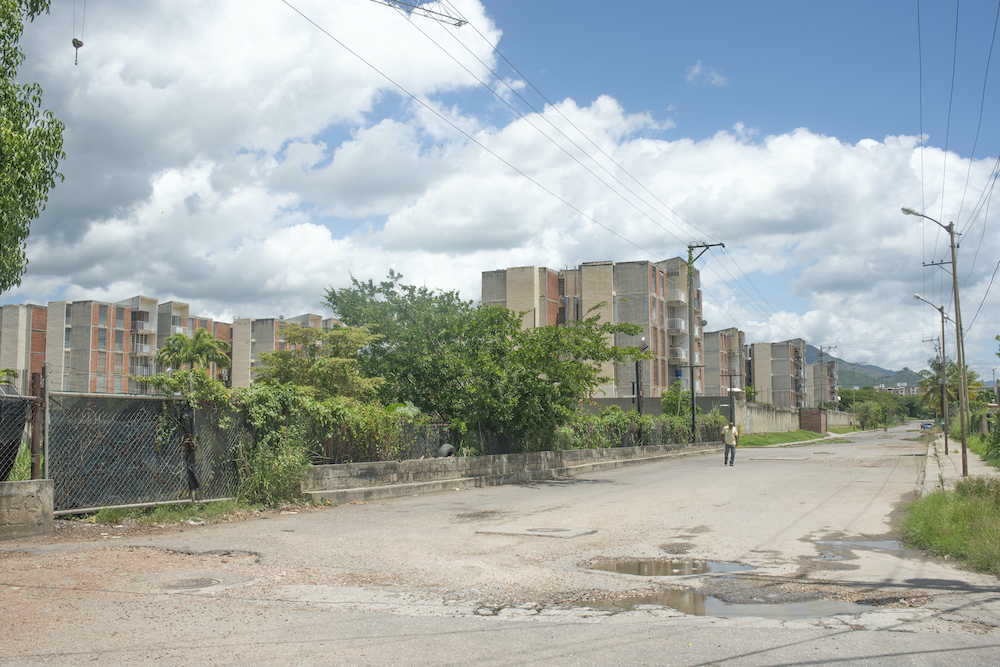
With the quarantine restrictions, the Guarenas-Guatire streets are rather lonely. Photo by Lexi Parra.
Nearly an hour later, a bus spewing black fumes pulls up to the stop. Julieth shows her travel pass—a new government requirement for workers during the lockdown—and hands over a dollar. The official bus fare is BsS 70,000 (35 cents), but because Julieth isn’t able to take out enough cash for the round trip, she ends up paying over three times the fare, one-way. “Sometimes they try to charge me $2 or $3, so at least today they’re in a good mood.”
Depending on the day, the bus can run into at least five military checkpoints. If soldiers desire so, the entire bus may have to get off at each of these stops to have their documents checked and see if they’re allowed to carry on. More than once, the highway has been completely shut down, making it impossible for Julieth to get to work.
Today, however, she’s lucky.
1:00 p.m., Caracas
After half a day of bus rides, Julieth finally arrives at her destination in El Cafetal, southeastern Caracas. Since last year, Julieth and Gereldys, one of her sisters-in-law, have been working 24/7 as caretakers for Carmen, an 80-year-old upper-class lady who fractured her hip last year. After the surgery, she hired two nurses (Julieth and Gederlys) through a private company.
Julieth studied nursing and is grateful for the job, especially since this is a private practice rather than a hospital. She monitors Ms. Carmen’s levels, gives her medication, and assists her in recovering full use of her hip.
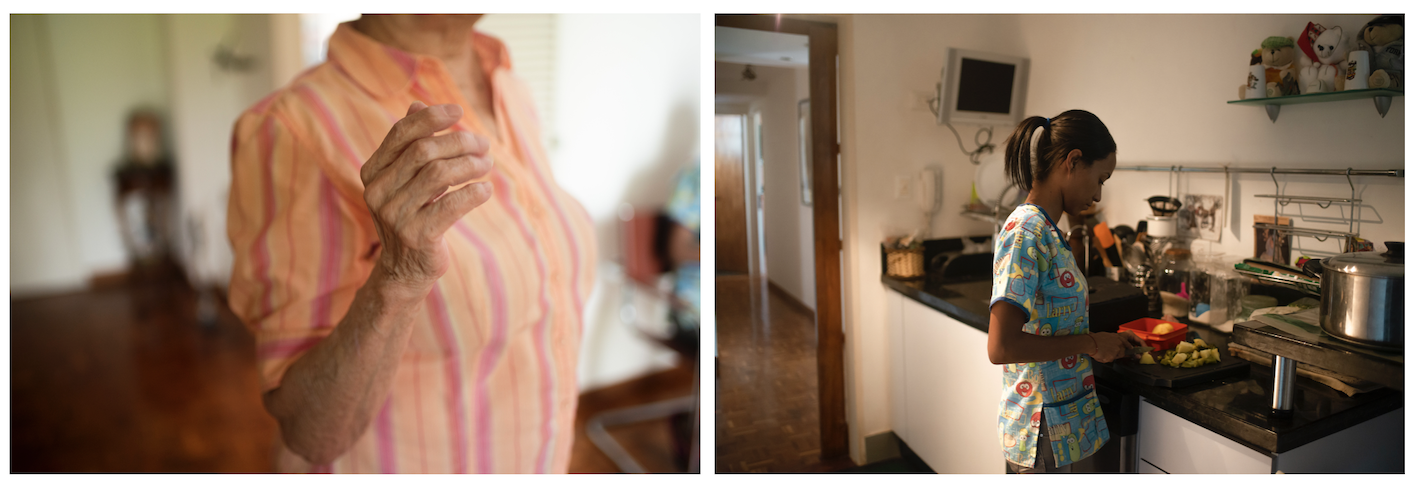
Caretaking is not their trade, but they’re still helping. Photo by Lexi Parra.
Carmen lives alone, so Julieth and Gederlys are the only ones taking care of both her health and her day-to-day affairs. Carmen’s son moved to Miami many years ago, and he can take care of his mother’s expenses, including Julieth’s salary. “Being old is expensive,” Carmen says. “I couldn’t move to the U.S. and become a burden for my son. I chose to stay here. He can help me that way.”
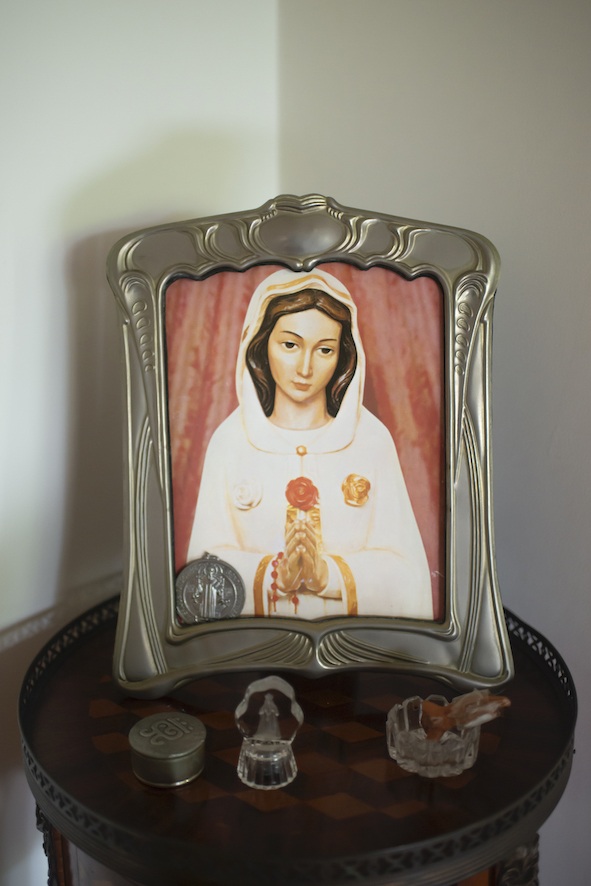
For some of them, their mere survival is miraculous. Photo by Lexi Parra.
Some time ago, when Carmen’s health improved, Julieth had to study her options. If she stayed, she’d stay as a housekeeper, helping with whatever was needed in the apartment. If she instead waited for another patient, she ran the risk of losing this opportunity. Julieth decided to stay. It’s not her passion, nor her trade, “but I’m still helping someone. And as long as Ms. Carmen wants us here, I’m staying.”
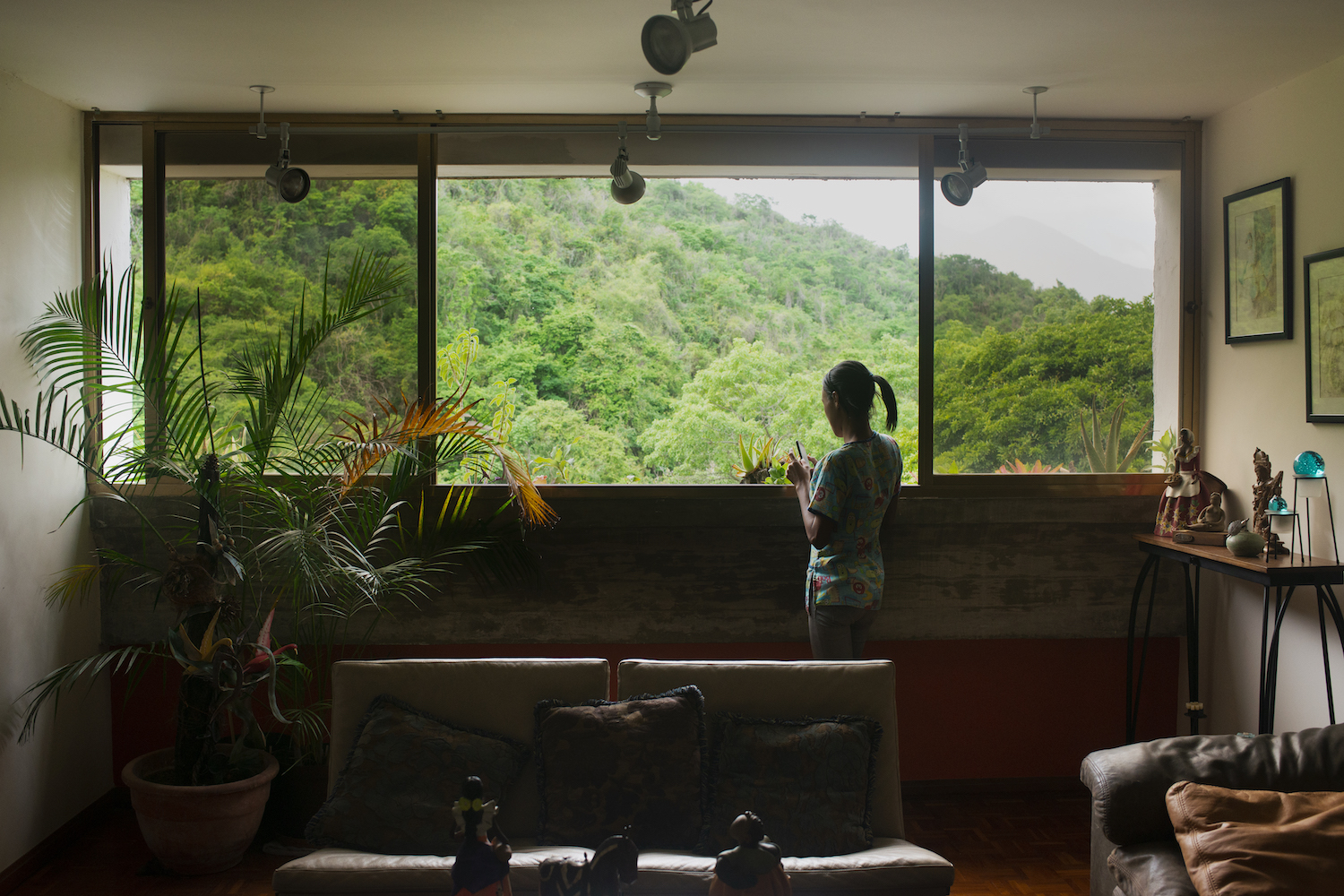
It was a hard choice for Julieth, but she’s glad making an honest living. Photo by Lexi Parra.
Now Julieth’s days are about cleaning the place, standing in long lines at the supermarket, and making Carmen’s meals.
‘I Shouldn’t Even Be Here’
About two years ago, Julieth, like many other young Venezuelans, had enough. She couldn’t find a decent nursing job and her server gig at a shawarma place wasn’t enough to make a living, with the inflation and all.
Through a cousin who had emigrated to Peru, she found her opportunity. She bought a ticket to Peru and even landed a job. But as the date of the trip approached, she was still missing her passport, an obstacle many Venezuelans face.
Julieth faced the uncertainty by spending all of her savings on a travel guide of sorts that’d help her cross the borders. She had crossed the illegal ditch into Colombia with her cousin’s wife and was waiting for her plane to Peru, when word came out about the “shut down” of the airline. The whole company that promised people like Julieth—Venezuelans sans passport—a safe flight within South America, was a scam.
She was stuck without a plan in a foreign country. Her only hope was to use the last few dollars she had hidden in her shoe to return home, but it wasn’t enough for both women. Julieth made the sacrifice to make sure her travelling partner could get back to Venezuela.
Over a week later, her entire family pooled together their money for Julieth’s trip back home. “I prefer, I don’t know, to come back home on foot rather than sell all my possessions like other friends had to do with the coronavirus shutdowns. Because, damn, if I have to bite the bullet, I rather do it under my own roof, in my land, in my home.”
Since her return, Julieth had her first child and finds support in her husband’s family. In darkness, there have also been moments of light.
Her Inspiration
Julieth’s in-laws have been more than supportive. Thanks to the women in her surrogate family, she found her footing in the healthcare trade.
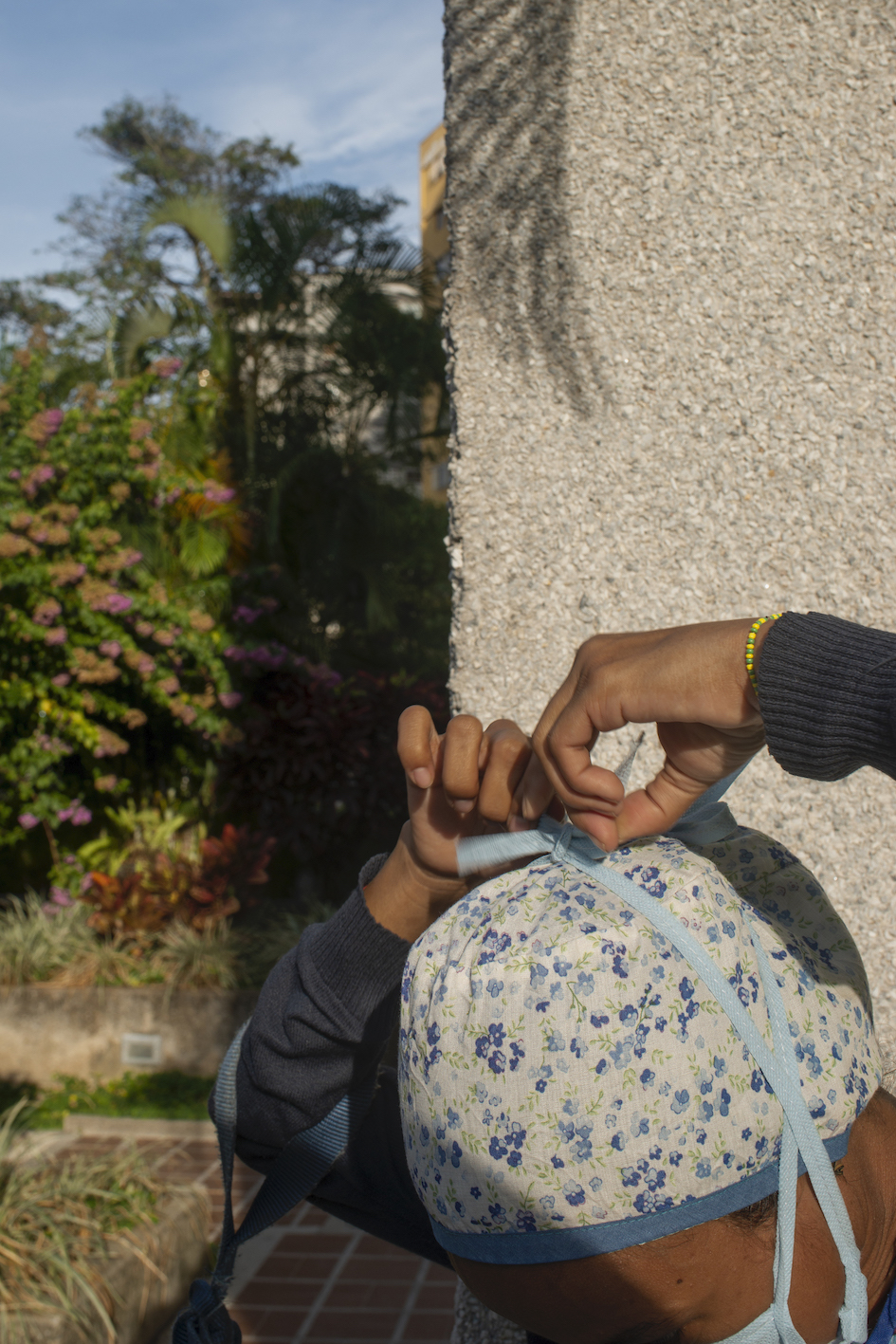
All of them nurses, all of them supportive. Photo by Lexi Parra.
Her mother-in-law has been a main source of inspiration. Iraida, 56, has worked as a nurse for over 30 years, and she’s now working at the Intensive Care unit of El Llanito, a Caracas hospital. “It’s heartbreaking to watch people suffer and not be able to grab their hand,” Iraida says, “but we don’t have enough gloves, or consistent water supply to know that we can wash our hands afterwards. We have to help them from afar. It feels cold, but I have a duty to continue working, and to come home as healthy as I can.”
When she’s not at El Llanito, she also leads community initiatives in barrios around Caracas in collaboration with the government, specifically focused on COVID-19 prevention and testing. While she doesn’t appreciate the constant propaganda, she legitimately wants to help. “It’s hard, going out to different barrios, not knowing who might be sick. We have children here. It’s risky, but this is the job.”
Julieth’s other sister-in-law, Marbelys, also lives in the apartment with the family. Right before the pandemic reached Venezuela, she left her hospital job for the private sector, helping patients in long-term recovery at home. Her routine is similar to Julieth’s now: every few days, she makes the trip to Bello Monte, in eastern Caracas (about two hours away by road) to take care of an elderly woman with advanced dementia. All the women in the family coordinate their schedules so that, despite their long shifts, one is always at the house, taking care of the kids.
Marbelis has a lot to deal with at home. She has two teenagers, Misael and Misbelys, and a younger son recently diagnosed with Asperger’s. His therapies have completely stopped, with no clue of when they can start again. “At least there are other kids here who are smart and can stimulate his mind, but it has been terrible, overall,” Marbelis says. “Life is completely paralyzed and who knows for how long?”
Julieth’s family shares a three-bedroom apartment between six adults, two teenagers and five children but, by being together, they get by. As Iraida says, “People create miracles. To live, to survive, to go out and get home healthy. Miracles. You live thanks to God, because money is never enough.”
Caracas Chronicles is 100% reader-supported.
We’ve been able to hang on for 22 years in one of the craziest media landscapes in the world. We’ve seen different media outlets in Venezuela (and abroad) closing shop, something we’re looking to avoid at all costs. Your collaboration goes a long way in helping us weather the storm.
Donate




